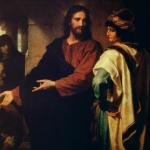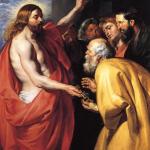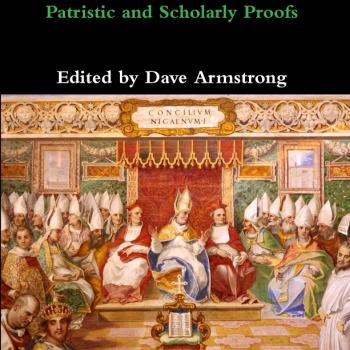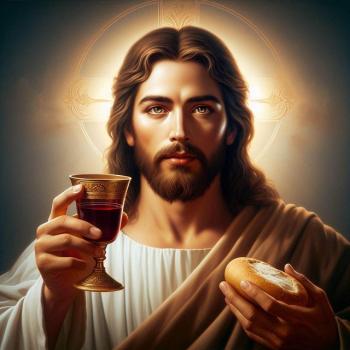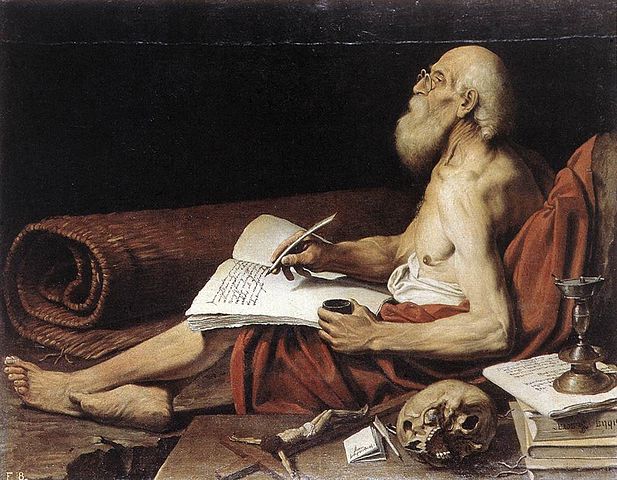
This is one of my many critiques of the book entitled, Roman but Not Catholic: What Remains at Stake 500 Years after the Reformation, by evangelical Protestant theologian Kenneth J. Collins and Anglican philosopher Jerry L. Walls (Grand Rapids, Michigan: Baker Academic, 2017).
*****
Kenneth Collins, in his chapter 3: “Scripture: No Greater Authority?” states:
Though Jerome had incorporated the Apocrypha into his translation [The Latin Vulgate], nevertheless he specifically cautioned against receiving this literature as sacred Scripture.
Collins cites him to the effect that he denied the canonicity of “Judith, Tobit, and the books of Maccabees.” Well, yes and no. Catholics agree that St. Jerome was the major exception as regards the deuterocanon (called “Apocrypha” by Protestants), among the Church fathers. But there are several anomalies in his treatment of the topic, and the matter of St. Jerome and the canon of the Old Testament is not quite as clear-cut as many assume it to be.
My good friend and fellow Michigander apologist Gary Michuta, in his excellent book, Why Catholic Bibles are Bigger (Port Huron, Michigan: Grotto Press, 2007), observed about St. Jerome (pp. 149-150; my own footnote numbering):
He . . . flatly denies that Tobit is part of the canon, [1] although elsewhere he cites it without qualification! [2] . . . Jerome adopts the popular convention in his Letter to Oceanus by quoting Baruch as a voice made by “the trumpets of the prophets.” [3] Sirach is both rejected and quoted as Scripture, [4] although it is formally quoted [5] and occasionally used without qualification. [6] Wisdom is also occasionally formally quoted. [7] Jerome even attributes the passages from Wisdom to the Holy Spirit. [8] Maccabees is used without distinction. [9] Jerome at times alludes to the Deuterocanonical sections of Daniel in his letters. [10] Deuterocanonical passages from Esther are likewise quoted. [11] . . . he lists Judith as one of the virtuous women of sacred Scripture . . . [12].
[1] Prologue to John.
[2] Commentary in Eccles. 8.
[3] Letter 77:4.
[4] Commentary on Isaiah, Book 2, 3:12; Letters 77:6: 108:22; 118:1; 148:2,16,18.
[5] Commentary on Jeremiah, Book 4, 21:14; Commentary on Ezekiel, Book 6, 18:6; and Letter 64:5.
[6] Commentary on Isaiah, Book 8, 24:4; Commentary on Ezekiel, Book 6, 18:6; Letter 57.1 To Pammachius; and Letter 125.19, To Rusticus.
[7] Commentary on Isaiah, Book 1, 1:24; Commentary on Zechariah, Book 3, 14:9; and Commentary on Malachi, 3:7 ff.
[8] Commentary on Galatians, Book 1, 3:2 . . . and Breviarium in Psalmos, Ps 9.
[9] Against Pelagians, Book 2:30; Letter 7, To Chromatius, Jovinus and Eusebius.
[10] Letter 3, 1 To Rufinus the Monk; Letter 22,9-10, To Eustochium; Letter 1, 9 to Innocent.
[11] Letter 48, To Pammachius, 14.
[12] Letter 65,1.
Collins also opines that St. Jerome’s view of the deuterocanon was shared by one of the giants among the Church fathers: St. Athanasius (296-373). Gary Michuta again illustrates the complexities and anomalies in his case (pp. 110-112; footnote numbering my own):
Athanasius quotes both Baruch and Susanna right along passages from Isaiah, Psalms, Romans, and Hebrews; he makes no distinction or qualification between them [1]. Wisdom also is used as an authentic portion of sacred Scripture . . .:
But of these and such like inventions of idolatrous madness, Scripture taught us beforehand long ago, when it said, ‘The devising of idols, as the beginning of fornication, and the invention of them, the corruption of life . . .’ [Ws 14:12] [2]
And later in the same work:
For since they were endeavouring to invest with what Scripture calls the incommunicable name . . . [3]
This reference to the “incommunicable name” comes from Wisdom 14:21 . . .
Athanasius quotes another passage from Wisdom as constituting the teachings of Christ, the Word of God. He undoubtedly uses it to confirm doctrine. [4] In another argument against Arians, he calls both the Protocanonical Proverbs and the Deuterocanonical Wisdom “holy Scripture” . . . [5] . . .Athanasius also quotes the book of Sirach without distinction or qualification, in the midst of several other scriptural quotations. [6] . . . Athanasius calls the Book of Judith Scripture. [7] Tobit is cited right along with several Protocanonical quotations [8] , and even introduced with the solemn formula “it is written.” [9]
[1] Four Discourses Against the Arians, Discourse 1.12.
[2] Against the Heathen, 11.1. Emphasis added.
[3] Against the Heathen, 1, 17.3.
[4] On the Incarnate Word, 4.6; 5.2.
[5] Defense Against Arius, 1, 3.
[6] Life of Anthony, 28 and Apology Against the Arians, 66.
[7] Four Discourses Against the Arians, Discourse 2.35 . . .
[8] Defense of Constantius, 17. Tobit is cited after Matthew and Isaiah.
[9] Defense Against Arius, Part 1, 11.
The great Protestant Bible scholar F. F. Bruce confirms Michuta’s analysis:
As Athanasius includes Baruch and the ‘Letter of Jeremiah’ in one book with Jeremiah and Lamentations [in his list of the OT canon], so he probably includes the Greek additions to Daniel in the canonical book of that name, and the additions to Esther in the book of that name which he recommends for reading in church [but doesn’t list as a canonical book] . . .
In practice Athanasius appears to have paid little attention to the formal distinction between those books which he listed in the canon and those which were suitable for instruction of new Christians. He was familiar with the text of all, and quoted from them freely, often with the same introductory formula — ‘as it is written’, ‘as the scripture says’, etc. (The Canon of Scripture, Downers Grove, Illinois: InterVarsity Press, 1988, 79-80; my bracketed comments, based on the larger context of Bruce’s analysis)
Collins mentions other Church fathers who “shared” Jerome’s “judgment regarding the Apocrypha.” He simply lists their names. I will actually document what they believed. Catholic apologist “Matt1618” produced a magnificent treatise, “Did Some Church Fathers Reject the Deuterocanonicals as Scripture?” I will be drawing heavily from it in the rest of this article. He states about Origen (182-254):
[H]e does put Baruch and the two Maccabees books in the canon. . . . he speaks approvingly of the Septuagint, which contains all the Deuterocanonical books. . . . Origen defends the use of the passage in Daniel 3 that Catholics have, the Song of the 3 children, Susanna, and Bel and the Dragon, as found in Daniel 13 and 14 of the Catholic Bible. He says that Bel and the Dragon and Susanna, Daniel 13 and 14 and only found in the Catholic Bible, is found in every single Church of Christ. Origen himself acknowledges that all Churches use these books. And in which way? He notes that he refers to them as Scripture. His opponent said it was a forgery. He corrects his opponent. It is not a forgery, but he notes his own use of them as Scripture. [To Africanus, 5]
Origen protests the fact that that these portions of Daniel now found only in Catholic Bibles, were “removed fro the Scriptures.” [To Africanus, 9] Here are more relevant passages from Origen:
But he ought to know that those who wish to live according to the teaching of Sacred Scripture understand the saying, ‘The knowledge of the unwise is as talk without sense,’ [Sirach 21:18] and have learnt “to be ready always to give an answer to everyone that asketh us a reason for the hope that is in us.” [1 Pt 3:15] [Against Celsus, 7:12]
[A]s is written in the book of Tobit: ‘It is good to keep close the secret of a king, but honourable to reveal the works of God,’ [Tobit 12:7]–in a way consistent with truth and God’s glory, and so as to be to the advantage of the multitude.” [Against Celsus, 5:19]
“Matt1618” comments: “He uses the phrase, ‘As is written’, in reference to Tobit. The phrase ‘It is written’ always is a reference to Scripture, both in Scripture itself as well as its use by the Fathers. Thus, Origen sees Tobit as Scripture.”
Tobias [Tobit] (as also Judith), we ought to notice, the Jews do not use. They are not even found in the Hebrew Apocrypha, as I learned from the Jews themselves.” However, since the Churches use Tobias, you must know that even in the captivity some of the captives were rich and well to do. Tobias himself says, “Because I remembered God with all my heart; and the Most High gave me grace and beauty in the eyes of Nemessarus, and I was his purveyor; and I went into Media, and left in trust with Gabael, the brother of Gabrias, at Ragi, a city of Media, ten talents of silver” (Tobias, 1:12-14). [To Africanus, 13]
But that we may believe on the authority of holy Scripture that such is the case, hear how in the book of Maccabees, where the mother of seven martyrs exhorts her son to endure torture, this truth is confirmed; for she says, ‘ ask of thee, my son, to look at the heaven and the earth, and at all things which are in them, and beholding these, to know that God made all these things when they did not exist.’ [2 Maccabees 7:28]” [Fundamental Principles, 2:2]
And that which is written about wisdom, you may apply also to faith, and to the virtues specifically, so as to make a precept of this kind, “If any one be perfect in wisdom among the sons of men, and the power that comes from Thee be wanting, he will be reckoned as nothing ” or “If any one be perfect in self-control, so far as is possible for the sons of men, and the control that is from Thee be wanting, he will be reckoned as nothing; (Wisdom 9:6) [Commentary on Matthew, 4]
“Matt1618” summarizes: “Thus, the Protestant apologists who argue that Origen spoke against the Books and did not view the Deuterocanonical books as Scripture, are wrong. Though it is true that some of these books (only some of these books, as some are canonical) are not termed ‘canonical’, that is irrelevant. The question is whether he saw these books as Scripture. Origien clearly terms these books as Scripture, according to Origen himself. He also uses these books to teach doctrine.”
Collins claims that St. Hilary of Poitiers (300-368) also rejected the Deuterocanon. He is again wrong (it’s easy to merely claim something; much harder to prove it). “Matt1618” observes: “[I]n St. Hilary’s list of the Old Testament, he includes . . . the books of Tobit and Judith. True, he does not give a list of all the Deuterocanonical books, but he gives us an indication that his list of Old Testament books is not limited to the Hebrew Scriptures.”
As you have listened already to Moses and Isaiah, so listen now to Jeremiah inculcating the same truth as they:–‘This is our God, and there shall be none other likened unto Him, Who hath found out all the way of knowledge, and hath given it unto Jacob His servant and to Israel His beloved. Afterward did He shew Himself upon earth and dwelt among men.’ [Baruch 3:36-38] [On the Trinity, 4:42]
“Matt1618” comments: “He already describes that his listeners have already heard Moses and Isaiah. In the same way that Moses and Isaiah speak, so does Jeremiah. What book is St. Hilary referring to? Jeremiah speaks through Baruch in the same manner as he speaks through the book “Jeremiah”, but also Moses and the prophet Isaiah. Baruch is of Scriptural status, according to St. Hilary.”
Such suggestions are inconsistent with the clear sense of Scripture For all things, as the Prophet says [ref 2 Maccabees 7:28], were made out of nothing; it was no transformation of existing things, but the creation into a perfect form of the non-existent.” [On the Trinity, 4:16]
“Matt1618”: “What is the clear sense of Scripture? What Maccabees says is clear Scripture and is the word of a Prophet, according to St. Hilary. It proves that God made everything out of nothing. This very important doctrine, according to St. Hilary, is proved through the Prophet who writes Maccabees, which he identifies as Scripture. Thus not only does St. Hilary affirm Prophet Status for a Deuterocanonical book, but Scriptural status.’
Then, while the devout soul was baffled and astray through its own feebleness, it caught from the prophet’s voice this scale of comparison for God, admirably expressed, ‘By the greatness of His works and the beauty of the things that He hath made the Creator of worlds is rightly discerned’ [Wisdom 13:5].” [On the Trinity, 1:7]
“Matt1618”: “The book of Wisdom, another Deuterocanonical book, is said to be written by a prophet, according to St. Hilary. The Prophet who writes in Wisdom proves the greatness of God. Again, Wisdom is clearly Scripture.”
Collins claims also that St. John Damascene (645-749) rejected the Deuterocanon, and is incorrect in his historical facts yet again:
And hence it is that in the Old Testament the use of images was not common. But after God (Jn 1:14, Tit. 3:4) in His bowels of pity became in truth man for our salvation, not as He was seen by Abraham in the semblance of a man, nor as He was seen by the prophets, but in being truly man, and “after He lived upon the earth and dwelt among men, (Bar. 3:37) worked miracles, suffered, was crucified, rose again and was taken back to Heaven, since all these things actually took place and were seen by men, they were written for the remembrance and instruction of us who were not alive at that time in order that though we saw not, we may still, hearing and believing, obtain the blessing of the Lord. [An Exposition of the Orthodox Faith, Book IV, Chapter XVI; he cites Baruch as Scripture again in ch. XVII]
“Matt1618” comments: “[H]e refers to Biblical events and in speaking of Jesus, he refers to Baruch in [his] description of Jesus. Baruch obviously prophesies about how Jesus would come to dwell among men. The background is St. John proving that the use of images are okay. The basis for it becoming okay is when Jesus became man. He writes that the Old Testament did not use images much, but per a prophecy of Baruch 3 fulfilled in Jesus, the situation would change.
The divine Scripture likewise saith that ‘the souls of the just are in God’s hand’ [Wisdom 3:1] and death cannot lay hold of them.” [Orthodox Faith, 4:15]
It appears then that the most proper of all the names given to God is “He that is,” as He Himself said in answer to Moses on the mountain, Say to the sons of Israel, He that is hath sent Me (Ex. 3:14). For He keeps all being in His own embrace, like a sea of essence infinite and unseen. Or as the holy Dionysius says, “He that is good.” For one cannot say of God that He has being in the first place and goodness in the second.The second name of God is o qeos, derived from qeein, to run, because He courses through all things, or from aiqein, to burn: For God is a fire consuming all evils (Deut. 4:24): or from qeasqai, because He is all-seeing (2 Macc. 9:5): for nothing can escape Him, and over all He keepeth watch. For He saw all things before they were, holding them timelessly in His thoughts; and each one conformably to His voluntary anti timeless thought, which constitutes predetermination and image and pattern, comes into existence at the predetermined time. [Orthodox Faith, 1:9]
“Matt1618”: “Here St. John Damascene is speaking of God’s immensity. He is out to prove that God is omniscient. He refers here to God as all-seeing. (This specific term is not used of God in any non-Deuterocanonical book.) The Protestant editor Philip Schaff acknowledges that it is a reference to 2nd Maccabees 9:5.”
***
Photo credit: St. Jerome, by Leonello Spada (1576-1622) [public domain / Wikimedia Commons] The first eyeglasses were invented in Italy, c. 1286 [!]
***


